Society
Value Creation Dashboard
In 2023 a project was initiated to develop a ‘Value Creation Dashboard’ that is tailored to the information needs of the SLT to track the performance of all Vebego companies in an efficient and effective way.
Currently, management information provided to the SLT is mostly financially oriented; in some cases very detailed and lacking comparability between companies. With the Value Creation Dashboard, we structurally steer our business based on the Six Capitals of Value Creation; information needs therefore extend beyond only financial indicators. The dashboard will play a crucial role in discussions and decision-making by the SLT.
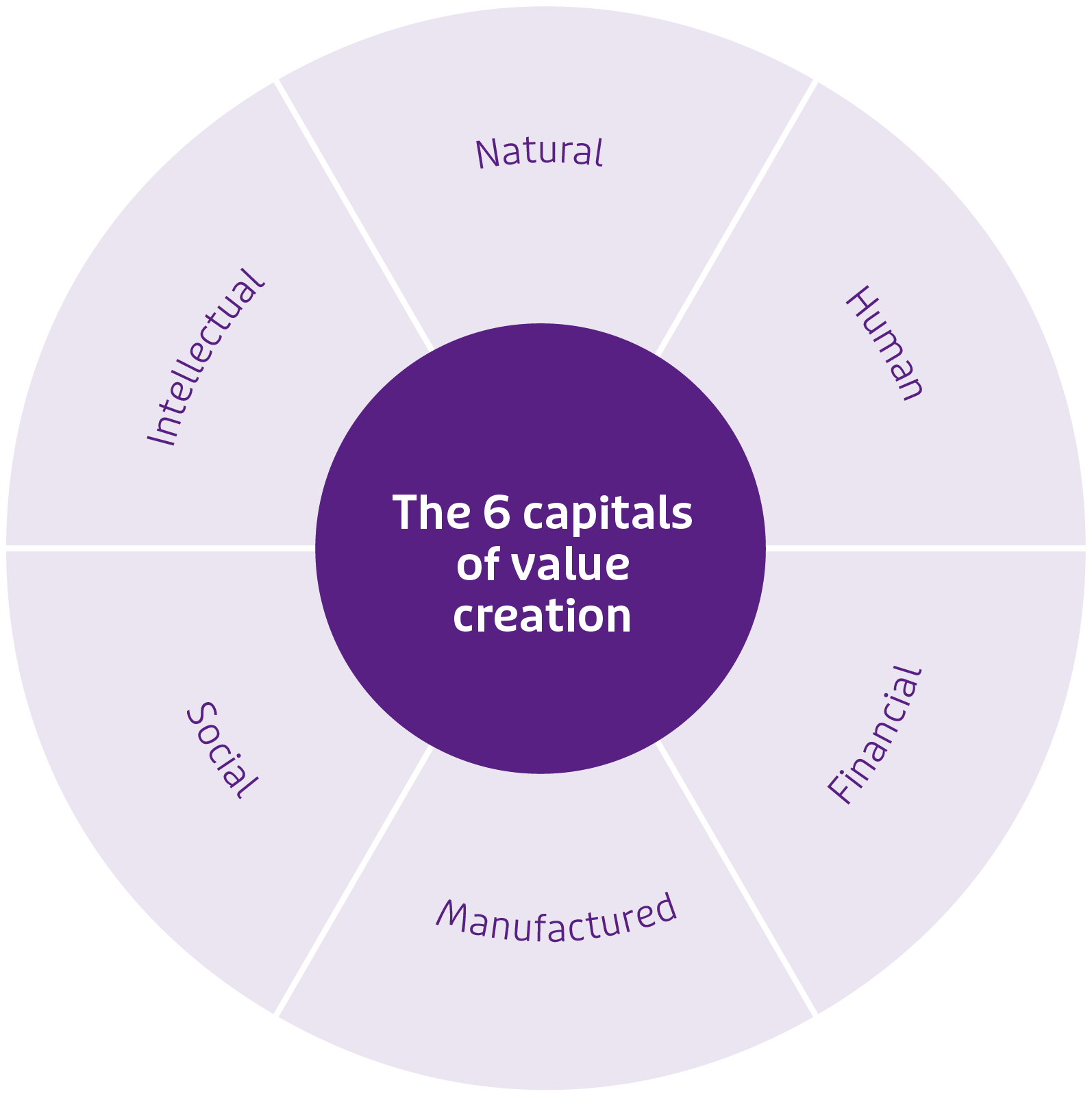
Moreover, we enable our companies to transform their business to not only be more sustainable, but also to become more resilient and adaptive to climate and social changes. In addition, the dashboard supports development of transparent external reporting towards our stakeholders, which is key under the upcoming CSRD legislation.
All the important elements of value creation need to be included: Employees, Customers, Society and Finance. The defined KPI’s in the Value Creation Dashboard are therefore based on the Six Capitals of Value Creation:
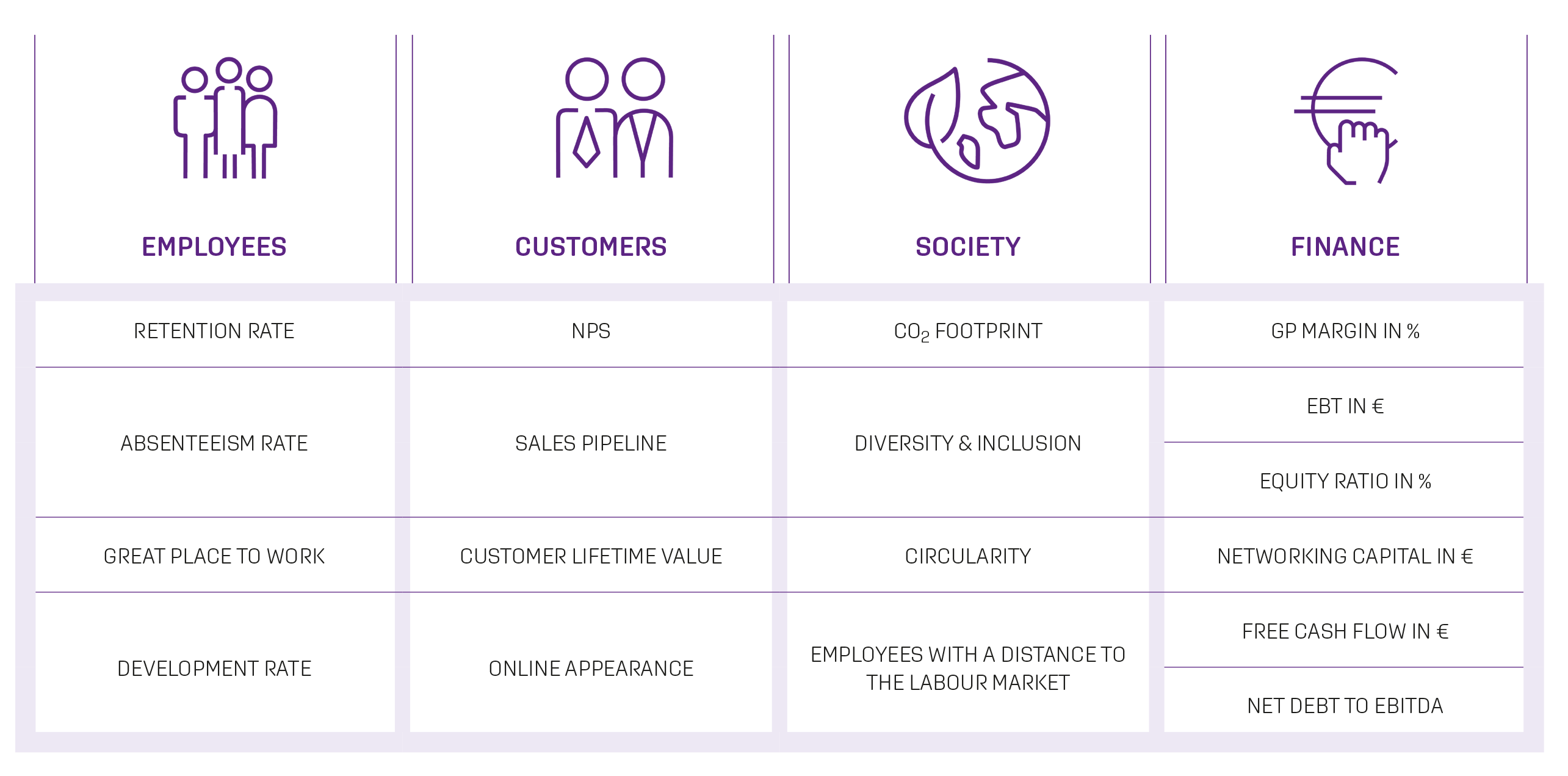
Value creation KPIs
Initially, all companies will have to report on the finance KPIs and our strategic core companies will also have to report on the non-financial KPIs.
The first (test) reporting of the Value Creation Dashboard will be done in April 2024 covering the 1st quarter of 2024. In preparation for this, during the 1st quarter of 2024, in-depth discussion will take place with the employees responsible for reporting the data over the 1st quarter, to make sure we cover all issues around the definition of KPI’s, data availability and efforts in the collection of data.
Sustainability
Key to the strategy of Vebego is that, through our activities, we have a positive impact on people, planet and society. Our business needs to be sustainable in order to create meaningful jobs and to contribute positively to quality of life as well as the state and future of our planet.
Corporate Sustainability Reporting Directive (CSRD)
What it means for Vebego to be sustainable and have an impact is covered by our sustainability strategy and is an integral part of our overall strategy. The sustainability strategy supports us not only in achieving our goals of creating meaningful jobs and delivering positive impact to customers and society, but also in communication with our clients and in preparation for upcoming legislation. In particular, the Corporate Sustainability Reporting Directive (CSRD) which, as of 2025, obligates large companies like Vebego to report on their impact on people, planet and society.
In 2022, we centred our strategy around these three important elements of the performance: Employees, Customers and Society. We see the 4th element, Finance, more as a prerequisite for continuity. During 2023 we continued our project in preparing for the implementation of the CSRD. The essence of the CSRD is transparent reporting on topics that are key to our sustainability strategy. This implies documenting our sustainability governance, policies, how we arrived at topics we consider key to our strategy, setting targets on what we want to achieve and showing the progress we are making towards these targets. The CSRD requires us to not only assess the impact of our own organisation on people and the planet, but also the impact of our activities across the ‘value chain’, along with our own operations. This chain consists of (sub)suppliers (upstream value chain) and clients (downstream value chain):
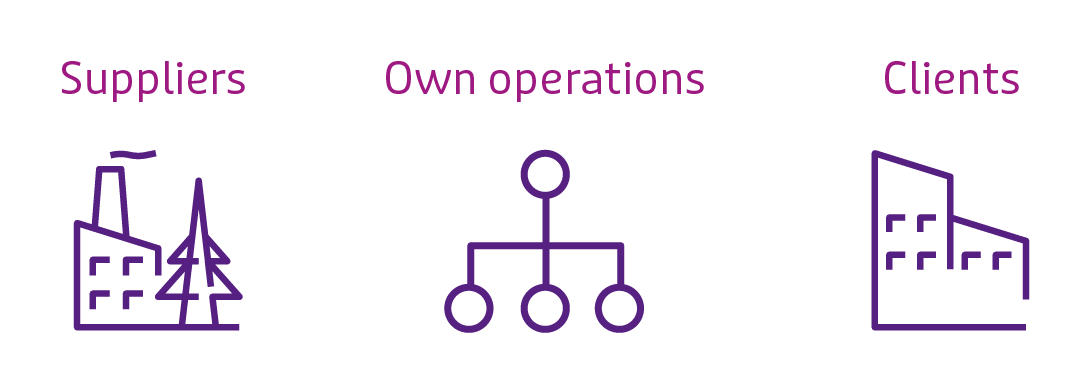
In this way, the ongoing preparation for the CSRD has presented us with the opportunity to further strengthen our sustainability strategy and execution, especially by:
performing an assessment of potential impacts, risks and opportunities across a range of environmental and social topics; with the assessment, we determine whether the potential impacts, risks, et cetera should be reflected in our sustainability strategy and thus included in the project for preparation for the CSRD;
implementing ‘performance management’ for all topics we determine as being essential to our strategy. Performance management implies that for each essential topic we have a baseline on performance, set targets, create action plans to reach those targets, collect data and report on progress made.
Although the CSRD is in essence about transparency on governance, policies, assessment, targets and progress, it describes numerous disclosure requirements that need to be fulfilled to be compliant to the CSRD. In 2024, a gap assessment will be made between what is available and what is required. We are preparing for the CSRD based on our current understanding and knowledge. We will reassess our efforts during 2024/2025 based on available guidance and best practices.
Double materiality assessment
We need to perform a double materiality assessment of our potential sustainability impact, risks and opportunities on a range of topics and across the full value chain. This requires different approaches, depending on the combination of sustainability topic and its stage in the value chain. This is visualised in the overview below:
Value Chain | |||||
|---|---|---|---|---|---|
Topic | Impact by | Impact on | Upstream ((Sub-) Suppliers) | Own operations | Downstream (Clients) |
Environmental | General | CO₂e Scope 1/2 | |||
Products | CO₂e Scope 3 | ||||
Resources and Circularity | |||||
Water | |||||
Pollution | |||||
Biodiversity and ecosystems | |||||
Services | CO₂e Scope 3 | ||||
Resources and Circularity | |||||
Water | |||||
Pollution | |||||
Biodiversity and ecosystems | |||||
Social | General | Own workforce | |||
Consumers and end-users | |||||
Products | Workers in the value chain | ||||
Affected communities | |||||
Services | Workers in the value chain | ||||
Affected communities | |||||
Until mid-2023, we focused our assessment mainly on our own operations. During the 2nd half of 2023, we also directed our attention to the assessment of potential environmental and social topics in the upstream value chain. Environmental impacts related to purchased products can be captured through preparation of Digital Product Passports (DPP). A DPP gives information on the impact that the products we buy have had on Green House Gas (GHG) emissions and resource and water usage. The DPP can also be used to assess the impact of materials used for our products on Pollution and Biodiversity.
We are also in the process of assessing which of the services we buy has the most significant impact in terms of CO2e footprint. An approach to assessing the impact of purchased products and services on social aspects (workers in the value chain and affected communities) is under development and by nature the most difficult to establish (considering the extent of our value chain).
On the environmental side, GHG emissions, Circularity and Resource have been prioritised from our assessment. On the Social side, People & Culture are currently defining the exact strategic topics to focus on.
Performance management
As mentioned, once we take a topic into our sustainability strategy, we need to make sure we implement adequate performance management. Below we will highlight the status in this regard for our current main topics.
Greenhouse Gas emissions (CO2 equivalents)
Scope 1, scope 2 and categories 6/7 of scope 3
A reporting manual has been established and was used for reporting our footprint over 2023. This manual has led to increased data quality, more consistency between companies and increased efficiency.
The CO₂e footprint of the strategic core companies over the full year 2023 was as follows:
CO₂e emissions per category (in tonnes) | 2020 | 2021 | 2022 | 2023 |
Electricity | 705 | 580 | 651 | 815 |
Heating | 1,302 | 887 | 824 | 1,656 |
Cars | 12,687 | 9,785 | 8,145 | 12,235 |
Vans | 40 | 1,121 | 2,708 | 3,748 |
Equipment | 350 | 347 | 1,763 | 1,858 |
Commuting | 2,548 | 2,172 | 2,059 | 2,878 |
Business travel | 283 | 304 | 206 | 367 |
Flights | 5 | 9 | 31 | 22 |
Total | 17,920 | 15,205 | 16,387 | 23,579 |
The footprint of our strategic core companies has significantly increased compared to 2022. However, more than 75% of this increase is caused by the first time full inclusion of Germany in reporting. Another 20% is caused by improvement of data quality, both in accuracy and completeness (inclusion of some additional activities).
Eliminating these effects, we realise that we are not making enough progress in reducing our emissions, remaining stable at around 2022 levels. We have the ambition that our strategic core companies need to achieve a reduction of their CO₂e footprint of 90% over 2029, compared to the baseline of 2023. Continuous focus on our roadmaps towards achieving this reduction and securing resources to execute this is essential in achieving our goal. That is why during 2024, our ambition will be validated, roadmaps will be updated and their quality improved where needed.
The footprint divided across the different scopes is as follows (in tonnes of CO₂e):
- 1 Only includes the footprint of employees travelling from home to work- or business location when receiving travel allowances (this is not the complete scope of category 6 and category 7).
In 2024, we will broaden the scope of CO₂e reporting to all the companies within the Vebego Group. This means additional companies will be introduced to Vebego's policies for sustainability reporting, which will require them to report on CO₂e and prepare roadmaps. This will increase our footprint, but we are still committed to our ambition of 90% CO₂e reduction by 2029.
Scope 3 (purchased products and services)
The products and services that we purchase as Vebego also come with a CO₂e footprint. This is the footprint from ‘cradle-to-grave’, meaning all emissions during the upstream value chain from extraction of raw material, production and transport down to treatment at end-of-life. Although no baseline has been established yet, the footprint will be much larger than we currently report on in scope 1 and 2.
During 2024, we expect to capture the biggest part of the footprint of purchased products through Digital Product Passports, which will also support measures in actually reducing the footprint. A pilot is ongoing within Alpheios, which will be followed by a roll-out in 2024 to other companies.
For purchased services, we are in the process of developing an approach to capture the footprint. A pilot is being conducted within the Dutch Vebego Central Purchase. This will also be followed by a subsequent roll-out in 2024 to other Vebego companies.
At this point, we are not able to state how much we can reduce our footprint on purchased products and services by 2030. We first need to establish a reliable baseline and then set our goals. We hope to do so in 2024. Meanwhile, we are of course maximising our efforts to reduce this footprint.
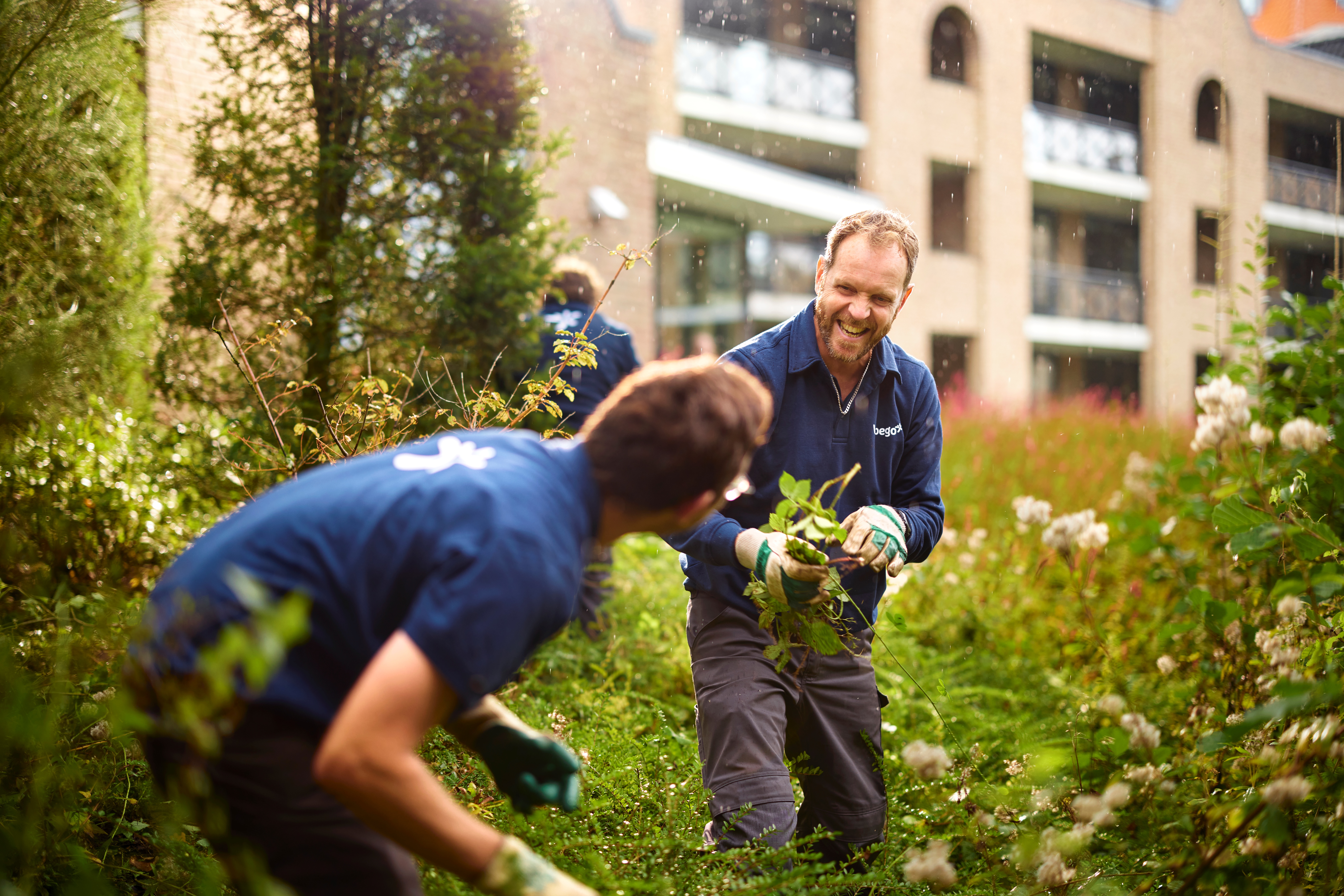
Circularity
As Vebego we strive towards maximising the use of renewable and recycled materials in our products, maximising the re-use and recycling of our products at end-of-life and thus minimising waste. This can be done, amongst other things, through design, materials used and recycling.
Circularity can be split into ‘circular inflow’ (the materials used in the products that we buy) and ‘circular outflow’ (the products that we use in our business or sell outside Vebego). Our ambition is that, by 2030, 50% of the materials used in the products procured by Alpheios will be circular. Increasing our circular inflow (using different materials and products) implies constantly finding new balances between increasing circularity, affordability and quality. Progress is also heavily dependent on innovation and developments in the market. Although it is difficult to predict developments, we are still positive that we will meet our ambition of 50% circular inflow by 2030. Alpheios handles the biggest percentage of the products we sell and use through our services. But naturally, other Vebego companies who do not buy their products through Alpheios will need to realise this target too. They will be involved during 2024. The year 2024 will also be used to set an ambition on circular outflow.
Digital Products Passports will, like for CO₂e in scope 3 purchased products, also play an essential role in getting a clear view of our circularity performance. During 2024 we will try to have them available for the majority (in terms of impact) of products bought throughout Vebego.
Calculating circular inflow percentages and outflow percentages is complex and depends on many assumptions and sources of input. We are developing a tool that will support a common understanding and can also be used for reporting.
EcoVadis
Vebego uses EcoVadis as a tool to measure our internal sustainability performance. Many companies use the tool and platform to show how they rank on a wide range of sustainability topics, both socially and environmentally. At the end of 2023, Vebego Facility Services in Germany scored the rating of 'silver' and Vebego AG in Switzerland the rating of 'gold'.
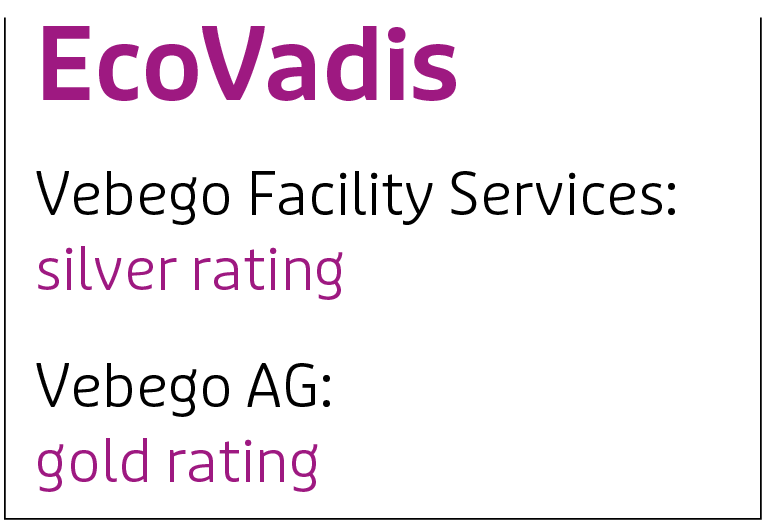
Vebego Foundation: international direction, local impact
On 1 January 2024, a new board for the Vebego Foundation was appointed. Not only has the board been expanded to include members from all the countries where Vebego is active, we are also working to raise awareness and rethink our construction trips abroad. This has set a new course.
Before starting in January 2024, the new international board spent six months with the old board. With the new board, the Vebego Foundation focusses its attention internationally, but also locally. The two go hand in hand. On the one hand, we want more publicity for the Vebego Foundation abroad. We were already active in the Netherlands and Flanders, but not in Germany, Switzerland, and Wallonia. We are still looking for the best way, but in any case, we want to initiate projects primarily at a local level.
Booster function international board members
Expanding the Vebego Foundation abroad is a nice challenge. Volunteer work in an organised form is a typically Dutch phenomenon; it is less familiar abroad. That is why we must look carefully at how we approach these projects because every country is different. Our international board members will play a driving role in this and fulfil a bridging function so that employees abroad also know where to find the Vebego Foundation and how to use it for social initiatives. The board has set itself the target of entering into three social partnerships per country and committing to them for three years. We are already at three in the Netherlands, two in Belgium and the collaborations have yet to start in Germany and Switzerland.
Financial and physical support
In the Netherlands, awareness of the Vebego Foundation among employees slumped a bit after the COVID-19 pandemic. But the new direction will hopefully change this. In addition to larger projects, we also want to raise awareness of the Vebego Foundation's contribution to supporting local and small initiatives. For example, with 'My Effort, My Project', employees can apply for financial support for an association, foundation, or other organisation to which they are selflessly committed. Last year we did great things with this, such as offering financial support to employee initiatives for the earthquake victims in Morocco. Our contribution to the Jarige Job foundation was also a success in 2023. Through this, we provided support both financially and physically to allow underprivileged children to still celebrate their birthday. In 2023, for instance, there were several ‘wrapping marathons’ with colleagues and customers. This was a wonderful way to reach families living in poverty through children. Moreover, it fits in seamlessly with the inclusiveness Vebego strives for. Everyone belongs!
Environmentally-friendly alternative to construction missions
Our construction projects abroad are also great examples of this. In 2023, we were again able to support our Community College projects in Sri Lanka and the S.O.S. children's villages in Morocco. Our construction missions hold great value for us, as they seamlessly merge our financial support with the provision of skilled labour. However, as important and as beautiful as construction missions always are, we feel the urgency to find a more environmentally friendly alternative. Air travel, no matter how you look at it, is environmentally damaging and increasingly difficult to justify. In 2024, therefore, together with a working group from Young Vebego, we are looking at what environmentally friendly alternatives there are for construction trips abroad.
Keep rolling up our sleeves
In any case, the Vebego Foundation wants to extend its physical presence in projects again to expand initiatives such as NL Doet, where we have accomplished great work in the past. This is another great opportunity to roll up our sleeves together and connect with colleagues and clients. We will definitely follow up on this in 2024. In addition, the Vebego Foundation will of course continue the work we did in 2023.
